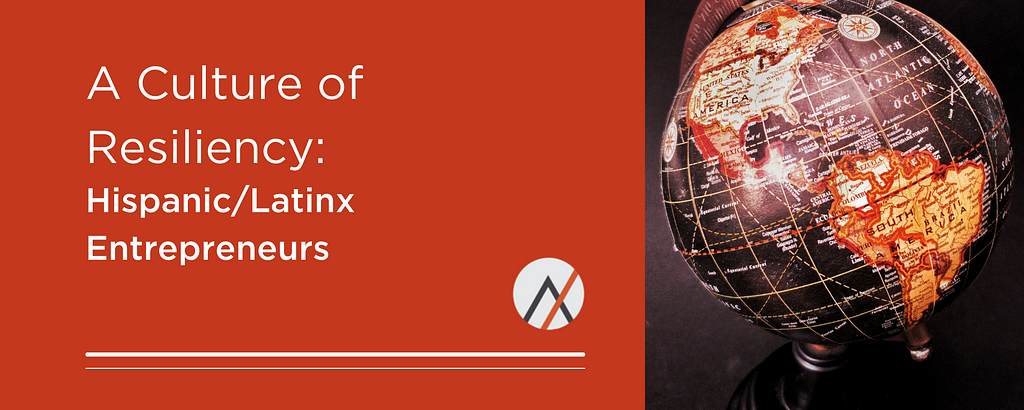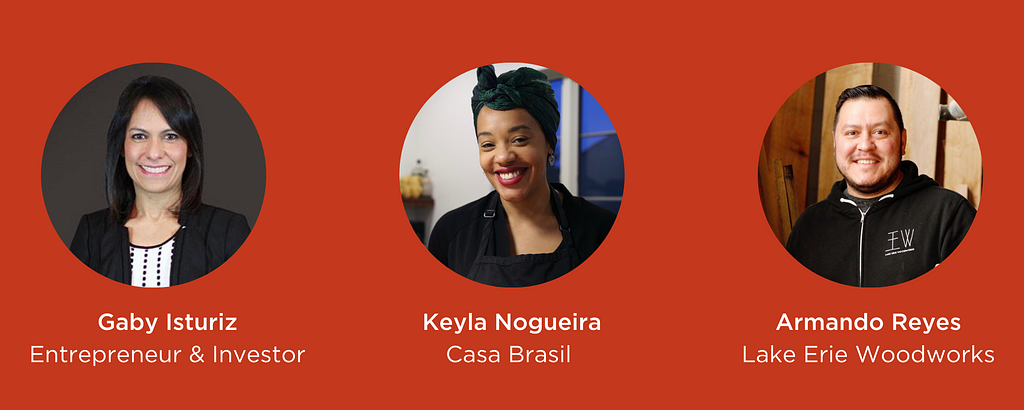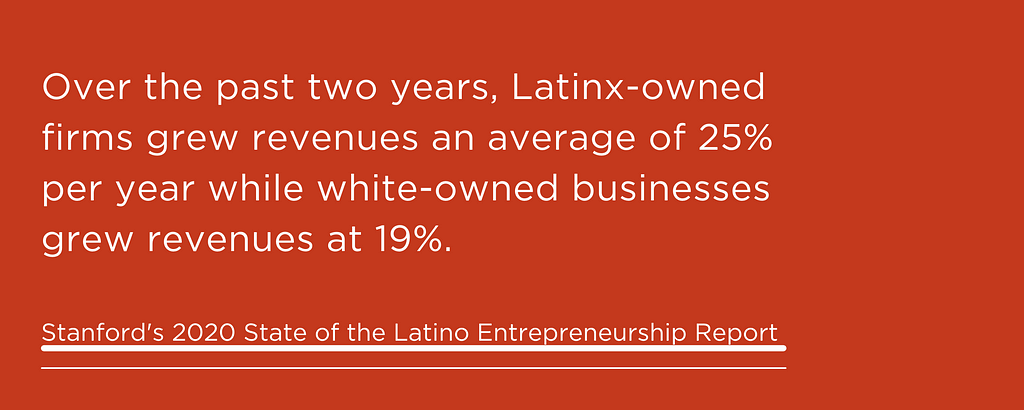Get inspired by these 3 Local Hispanic/Latinx Entrepreneurs

As we celebrate Hispanic/Latinx Heritage Month, we honor the contributions of generations of hardworking and resilient people. Latinos are diverse, speak different languages, and come from many different backgrounds. In the U.S., Latinos are the largest growing minority segment — 18.5% of the total U.S. population identify as Latina/o/e/x. Latinx owned-businesses are also the fastest-growing segment of the small business ecosystem. The number of Latinx business owners in the U.S. shot up by 34% over the last decade compared to only 1% for all other small businesses, according to the 2020 State of Latino Entrepreneurship Report.
This growing number of Latinx entrepreneurs face many barriers to entry, such as access to capital, getting approved for traditional loans, and challenges with access to information. The COVID-19 pandemic only exacerbated these obstacles. Business owners already facing difficulties in forming relationships with banks were unable to access Pay Protection Program (PPP) loans and federal funding to keep their businesses afloat. Even while experiencing systematic barriers, research shows that over the past two years, Latinx-owned firms grew revenues an average of 25% per year while white-owned businesses grew revenues by 19%. Resilience against many odds is one of the traits that define Hispanic/Latinx entrepreneurs. As business trends and projections show that Latinx businesses will be essential to this country’s economic growth and recovery, the time to invest in and support these entrepreneurs is now!
To highlight the diversity, creativity, and resiliency of the local Hispanic/Latinx business community, we reached out to Gabriela (Gaby) Isturiz, serial entrepreneur and investor, Keyla Nogueira, chefpreneur and co-owner of Casa Brasil, and Armando Reyes, owner of Lake Erie Woodworks. Get inspired by these 3 local Hispanic/Latinx Entrepreneurs as they share more about their backgrounds, overcoming challenges, and business hacks that keep them on track.

How has your heritage and culture influenced your entrepreneurial journey?
Gaby: Growing up in Caracas, Venezuela, any kind of resources were scarce, and things weren’t the most efficient either. So to make anything happen, you were forced to think out of the box and come up with creative solutions that weren’t obvious. However, not everything was a challenge; Venezuela is a very diverse country with amazing people always willing to help each other. I believe this upbringing shaped me as an individual and as an entrepreneur. I learned how to work and prepare to “survive” and how to be empathetic and resourceful to others.
Keyla: My entrepreneurial journey has a direct relationship to my roots. In 2014 I decided to start selling homestyle Brazilian food in Pittsburgh since there weren’t any other businesses doing what I do. So, after many years working as a caterer, hosting pop-up dinners, we opened Casa Brasil in 2018 as a pop-up restaurant to test our business concept.
Casa Brasil brings authentic Brazilian home cooking to the table. We serve the food that I grew up eating along with family recipes and other traditional dishes to Brazilian cuisine, but with my own touch.
A couple of months ago, I opened my second business, Mercearia, a Brazilian Mini Market that brings the flavors of Brasil to Pittsburgh but grocery style. This business also has a direct relation to my heritage since its main customer base is the region’s Brazilian community.
Armando: My heritage has been a major part of my journey. When my grandparents came to the US in 1956, my grandfather used his woodworking skills to find work in those early days. After that, he eventually passed the craft down to his seven boys and then to his grandchildren. Part of what he taught was more than just the woodworking skills, but also the idea that with hard work, you can use your hands to make a living and support your family.
Tell us about one major challenge you faced during your entrepreneurial journey and how you rose above it.
Armando: One major barrier that I continue to face as a business owner is my lack of business knowledge. Growing up, I was taught that getting an education and finding a good job were keys to success. It is good advice, but it did not give me the skills I need to be my own boss. Many immigrant cultures tend to be risk-averse, often relying on what we need to do to survive instead of exploring and finding your passion and driving toward it.
Keyla: The lack of start-up capital when launching my business. I started with the basics and relied on funds from my paycheck to fund the business in the beginning.
Gaby: My entrepreneurial journey has been full of challenges along the way. In my early twenties, I left my country, family, and pretty much life as I knew it. Starting almost from nothing, barely speaking the language in a different culture, I had to work at least twice as hard to level set and later succeed. It’s been an incredible journey, but also plenty of sacrifices. I guess I learned to prioritize and be happy with the notion that anything takes time, and you cannot do it or have it all at once. Tenacity, focus, and patience were the main three pillars that have helped me overcome the many challenges throughout my long journey as an entrepreneur.

What specific tools or resources do you use to help you and your business stay on track?
Armando: I like to find free or low-cost resources to help my business. I use Wave for accounting software, Squarespace for my website, and Canva for some graphics resources. Many of these give me a professional look, work with my branding, and are free or inexpensive.
Keyla: I stay on track with Google Keep and the scheduling app, When I Work.
Gaby: I have a bag of tools and hacks that I couldn’t live without. To get started, I have a morning routine that brings structure and discipline to my day. If for any reason, I cannot follow it, I try to avoid regretting it and make sure I get back on track the next day. Here are some tools I depended on as CEO:
- Salesforce: If it wasn’t there, it didn’t happen.
- Hubspot: For all things inbound marketing and customer prospecting.
- Quickbooks: Gave me visibility and the ability to get a quick pic of the business.
- Bonusly: A great way to keep employees motivated to help each other.
- Grammarly: Helps to double-check your grammar.
- Slack: Goodbye to internal emails!
- Canva: Put together quick, professional artwork without having to get my designers involved.
What’s a piece of advice for aspiring Latinx entrepreneurs?
Keyla: Be patient with the process and yourself. Be open to changes. Follow your instincts. Ask questions. Ask for help. Take time off. Do the work. Take care of yourself. Celebrate the small and big wins. If you work with a “cultural” product like me, embrace your culture and roots. Have fun!
Armando: My best advice to new Latinx owners is to take advantage of EVERY opportunity you can. Meet people, take classes, go to seminars, network, find grants, work with others, collaborate, etc. Most of these opportunities are free. Make a name for yourself before you promote your business. People are buying you, not your products.
Gaby: I always try to be careful about giving general advice since things might differ depending on the person and the stage of their company. But one thing for aspiring Hispanic or Latinx entrepreneurs is to understand and embrace that our heritage can also be our “unfair advantage.” Figure out the skill you have that is your unique talent. I love a book by Ash Ali and highly recommend it to anyone wanting to learn more about this. It is called “The Unfair Advantage: How You Already Have What It Takes to Succeed.”
Want to keep the conversation going?
We encourage you to sign up for the Latinx Connect, a multi-day conference (October 14–16) that aims to move us beyond “celebrating” Latinxs and instead calls for empowerment and justice for the Latinx community, which faces numerous disparities in U.S. society, particularly those at the intersections of Latinx identity. The Ascender team will be leading a co-design session on October 16 during the inaugural virtual conference. Join us to brainstorm actionable ways to support the next generation of resilient Latinx founders and entrepreneurs.
Connect with us
Learn more about Ascender: https://ascenderpgh.com/
Sign up for our newsletter or send us a note: info@ascenderpgh.com
Follow us: Twitter — Facebook — LinkedIn — Instagram
From fledgling tech companies, healthcare innovators, and nonprofits to makers, creators, services and shops, Ascender is for Pittsburgh’s entrepreneurs. We help businesses of all types in the Pittsburgh region start and build a business through education and connectivity. See how Ascender can help you.
A Culture of Resiliency was originally published in Ascender on Medium, where people are continuing the conversation by highlighting and responding to this story.

